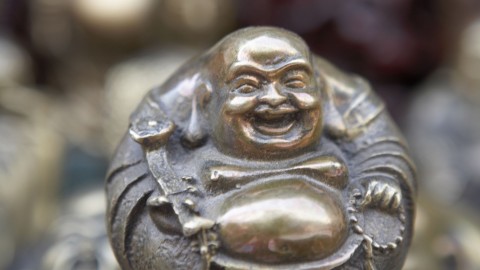Kansan left home when he was nine years old. He had a brilliant mind and studied both Buddhist and Confucian classics. Inspired by one of the books he read, for a time Kansan devoted himself to the study and practice of esoteric Buddhism in western Japan. Later he went to the capital city of Edo, where he perused the massive Buddhist canon.
After nearly two decades of these studies, Kansan finally went to see a Zen teacher. Well versed in Buddhist practices, Kansan mastered the Zen teachings in two years of intensive work.
Subsequently Kansan was sent to take over the abbacy of a temple in southern Japan. When he arrived, he found that drinking and carousing were so common in the area that the temple itself was accustomed to supplying visitors with wine, as if it were a lounge.
On the day that Kansan formally took over the abbacy of the temple, he destroyed every single wine jar, ashtray, and serving table. After that, guests were treated with a single cup of plain tea.
Three years later, Kansan retired. He disappeared into the mountains, putting a sign over the door of his hut that simply said, “Content.”
Be Empty
Kansan learned from the Buddhist and Confucian classics – To Be Empty.
When he went to Japan and practiced and studied this for two decades, he went to Zen for it’s practical application. He mastered the Zen teachings in two years of intensive work. This was again all theories. So the teacher sent him to the abbacy of a temple in southern Japan, to create practical experience.
Once he had his own experience of – Emptiness – he retired from the temple and disappeared into the mountains, putting a sign over the door of his hut that simply said, “Content.”
Unless we create our own experience we are never content. What is that experience we are always seeking for is our Own Emptiness. We may give various words for that but the real thing is Emptiness.
For centuries emptiness has been condemned.
Emptiness is beautiful.
And the foolish people have been telling you. “The empty mind is the devil’s workshop.” The empty mind is God’s workshop! The occupied mind is the devil’s workshop.
But one has to be truly empty. Just being lazy does not mean that you are empty; not doing anything does not mean that you are empty. Thousands of thoughts are clamoring inside. You may be lazy on the outside, but inside much work is going on. Many walls are being created, new prisons are being prepared, so that when you get fed up with the old you can enter into the new. Old chains may break any time so you are creating new chains in case the old chains break; then you will feel very empty.
Once in a while it happens naturally – because it is your very nature to be free. So once in a while, in spite of you… seeing a sunset, suddenly you forget all your desires. You forget all lust, all hankering for pleasure. The sunset is so beautiful, so overwhelming, that you forget the past and the future; only the present remains. You are so one with the moment, there is no observer and no observed. The observer becomes the observed. You are not separate from the sunset.
You are bridged; in such a communion you come into a clearing, and because of the clearing you feel joyous . But again you are back into the black hole for the simple reason that coming out into the clearing you need courage to remain in the empty sky.
This courage – not escaping but coming into the clearing, seeing the sky unclouded, listening to the songs of the birds without distorting. And then again and again you are becoming more and more attuned with the emptiness and the joy of being empty. Slowly slowly, you see that emptiness is not just emptiness; it is fullness, but a fullness of which you have never been aware, a fullness of which you have never tasted.
So in the beginning it looks empty; in the end it is full, totally full, overflowing full. It is full of peace, it is full of silence, it is full of light.
Learning from the story Content: Be Empty
Experience Learning
Zen’s standpoint is – Man is, not matter, although he is covered with matter. He is not mind, although he is covered with mind. Nor is he an individual soul. He is a pure nothingness. Man, from this standpoint, which is the standpoint of Zen, is almost like an onion. You go on peeling it, one layer after another layer, hoping that you are going to find something. Finally, when you have peeled all the layers off, your hands are full of emptiness; nothing is left. The onion was only layers and layers and layers and layers. Behind those layers was emptiness, nothingness, which will not be visible to the eyes, which will not be tangible to the hands.
Zen has taken the ultimate standpoint about man, you cannot go beyond that. Here ends the whole journey, the pilgrimage of the seeker.
Zen wants you not to stop at matter. Respect it, it serves you; care for it, it cares for you. You are not the mind – don’t make it a master. It is a good servant – use it. Use it so that you can reach beyond it. It is a ladder to go beyond, but don’t get caught up with it.
The “soul” is simply a consolation to people, because if you say to them that meditation will end up in nothingness … In a million, perhaps one person will become interested in meditation. And if you tell them, “All your effort will come to a vast nothingness,” you will frighten them. You will create a question in their minds: “Then what is the purpose? We are – at least, we are. Doing meditation, we will not be.” It is going to be the ultimate death. Yes.
Gautam Buddha was continually asked, “Why do people go on coming to you when you offer nothing but nothingness?”
And Buddha said many times, “Nothingness is not just no-thing-ness. It has its own universality. It is becoming as vast as the whole universe, unlimited. Your personality is too small.”
The people who are afraid of nothingness, of dissolving not only their personality but their individuality too, remain with the third standpoint.
The soul is very consoling. At least it gives you something to hang on to. Zen does not give you anything; it simply takes away all the layers of the onion and then says to you, “Look, this is you – just pure nothingness.”
But the purity of it is so overwhelming that you are not, but your laughter is. You are not, but your joy is. It has become cosmic. You are not, but your ecstasy is, and now it is not confined to a small area of your personality or individuality; now the whole of existence is ecstatic. The birds flying and the flowers opening and the clouds showering – everything is happening in the deep nothingness of your realization of the cosmic emptiness as the source of all things.
Perhaps Zen alone has given a very scientific answer to the question. “From where do things come, and to where do they go back?” Even science shrugs its shoulders the moment you start asking them questions about the origin. All that has been said about the origin by the religions, by the scientific people, is simply guesswork. Nobody was a witness, obviously. How can there be a witness when existence has not started yet? You will come later on; you cannot come before. And, in fact, if there was a creator, existence was already there; otherwise how can the creator exist?
Tags: Be Empty Certain Situation Hidden Eye Neither Worldly Nor Saintly No Beginning Whole Cosmos










